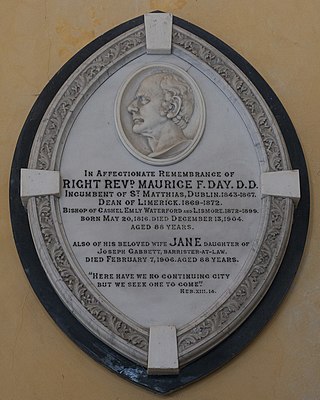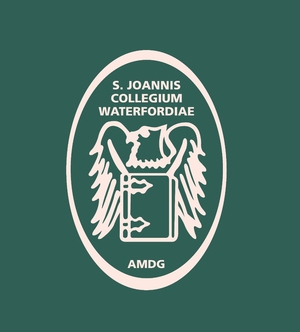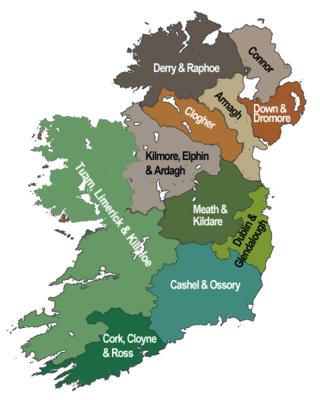Related Research Articles
William Lee was an Irish Roman Catholic prelate who served as Bishop of Waterford and Lismore between 1993 and 2013.
Frank Edwards was a teacher and prominent Irish communist.

Ballylooby is a village in County Tipperary in Ireland. It is in the barony of Iffa and Offa West, and is also a parish in the Roman Catholic Diocese of Waterford and Lismore.

The Cathedral of the Most Holy Trinity is the cathedral church of the Roman Catholic Diocese of Waterford and Lismore located in Barronstrand Street, Waterford City, Ireland. The cathedral is the oldest post-Reformation Catholic cathedral in Ireland, pre-dating the Roman Catholic Relief Act 1829 by some 36 years.

Patrick Kelly was an Irish prelate of the Roman Catholic Church. He served as the first bishop of the Diocese of Richmond in Virginia (1820–1822) and as bishop of the Diocese of Waterford and Lismore in Ireland (1822–1829).

Daniel Cohalan (1858–1952) was an Irish Roman Catholic clergyman who served as the Bishop of Cork from 1916 to 1952.

The United Dioceses of Cashel and Ossory is a diocese of the Church of Ireland in the south-eastern part of Ireland that was formed from a merger of older dioceses in 1977. The diocese is in the ecclesiastical province of Dublin.
William Cecil de Pauley was a Church of Ireland bishop and author in the 20th century.

Maurice FitzGerald Day was a Church of Ireland bishop in the last quarter of the 19th century.

St John's College was a Roman Catholic seminary founded in 1807 for the diocese of Waterford and Lismore.
Thomas le Reve was the first Bishop of Waterford and Lismore following the unification of the two sees in 1363, and was also Lord Chancellor of Ireland. He was a strong-minded and combative individual, who was not afraid to clash with his ecclesiastical superiors.

Jeremiah Joseph Doyle, was an Irish born Catholic bishop, the bishop of Grafton, later re-named the diocese of Lismore in New South Wales, Australia. One of his achievements was lobbying for, and acquiring funds for, the building of St Carthage's Cathedral at Lismore, which was constructed over the period 1892–1907, with the bell tower completed a few years later, after his death.
Nicholas Foran was the Roman Catholic Bishop of Waterford and Lismore. Born in Butlerstown, Co. Waterford, he studied locally and went to Maynooth College to study for the priesthood. He was ordained in 1808, moving back to Waterford where he was Professor in the Diocesan College, in 1814 he was appointed president of St. John's College, Waterford. He served as parish priest in Lismore and then in Dungarvan, County Waterford.
Monsignor Michael G. Olden BA, BD, DHistEccl. was an Irish priest, historian and educator who served as President of Maynooth College from 1977 to 1985 and hosted the visit of Pope John Paul II to the college in 1979.

Alphonsus "Phonsie" Cullinan is an Irish Roman Catholic prelate who has served as Bishop of Waterford and Lismore since 2015.

The Archdeacon of Armagh is a senior ecclesiastical officer within the Anglican Diocese of Armagh. The Archdeacon is responsible for the disciplinary supervision of the clergy within the Diocese.
Bernard HackettCSSR was an Irish Roman Catholic clergyman who served as the Bishop of Waterford and Lismore from 1916 until his death.
Pierse Power was an Irish Roman Catholic clergyman who served as the Bishop of Waterford and Lismore from 1887 until his death.
John Power was an Irish Roman Catholic clergyman who served as the Bishop of Waterford and Lismore from 1887 until his death.
Dominick O'Brien,DD was an Irish Roman Catholic clergyman who served as the Bishop of Waterford and Lismore from 1887 until his death.
References
- ↑ Frank Edwards Waterford Ireland
- ↑ Archdeacon Byrne The Tablet, 28 October 1933
- ↑ Frank Edwards
- ↑ Waterford &f Lismore -A Compendious History of the United Dioceses by Patrick Power, M.R.I.A., D.Litt., Emeritus Professor of Archaeology, University College, Cork, 1937.